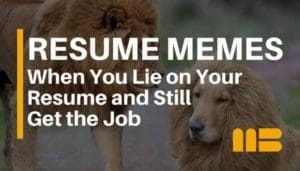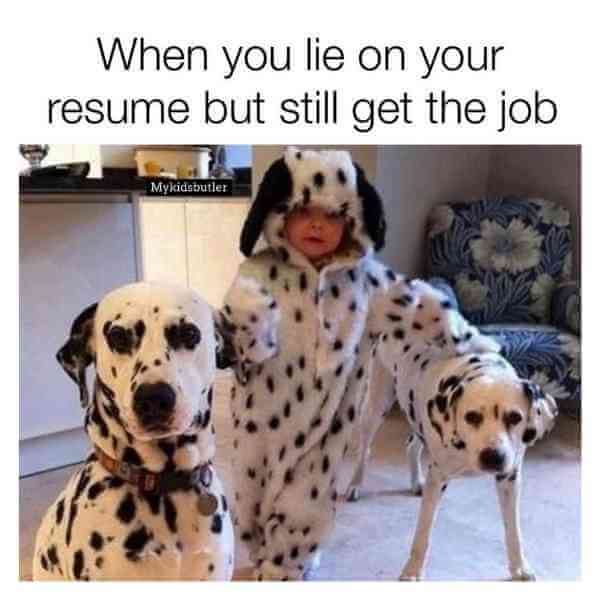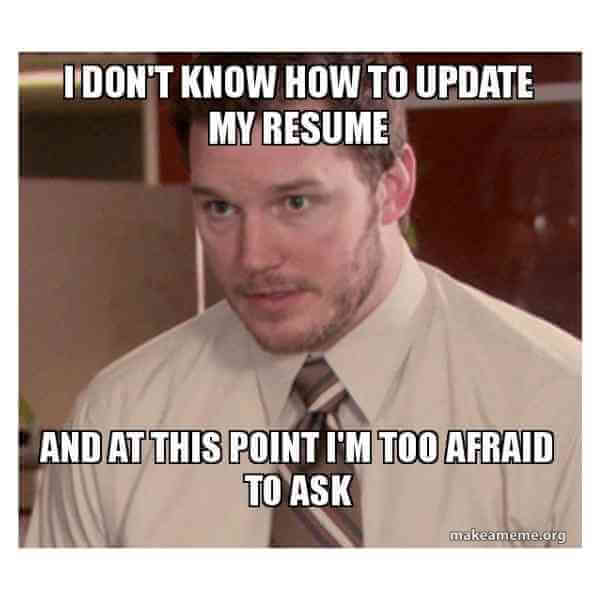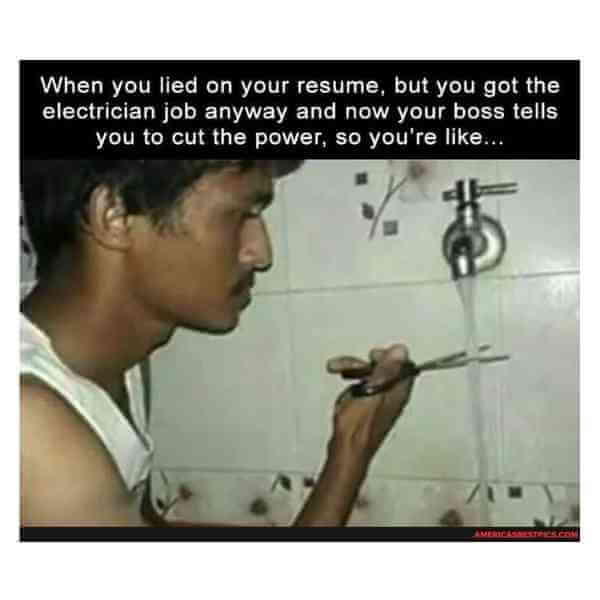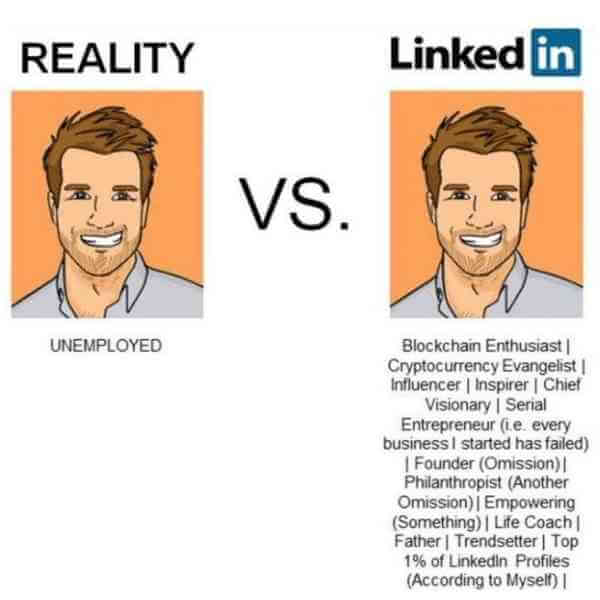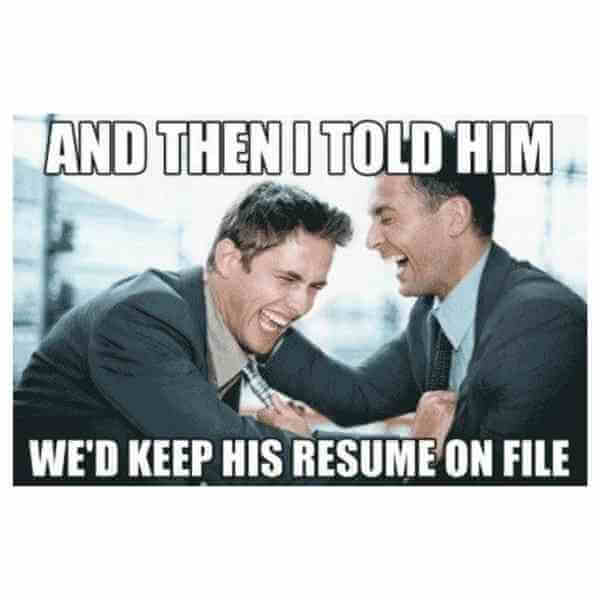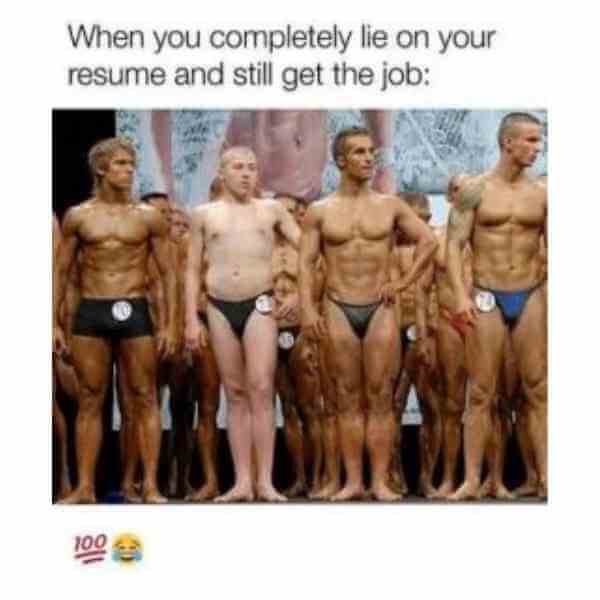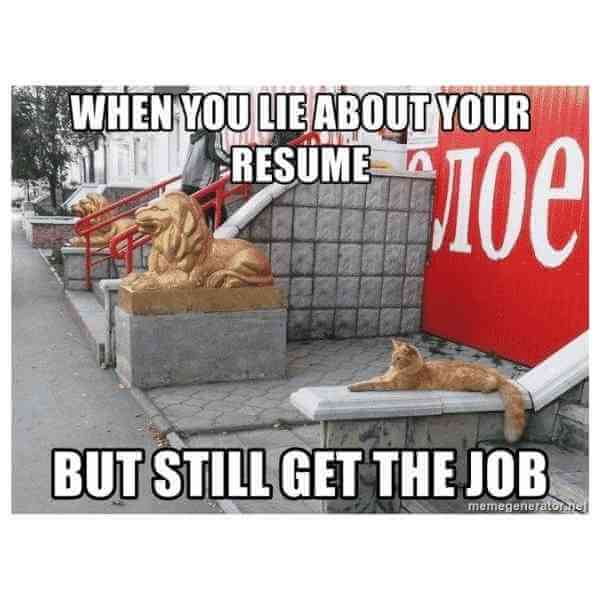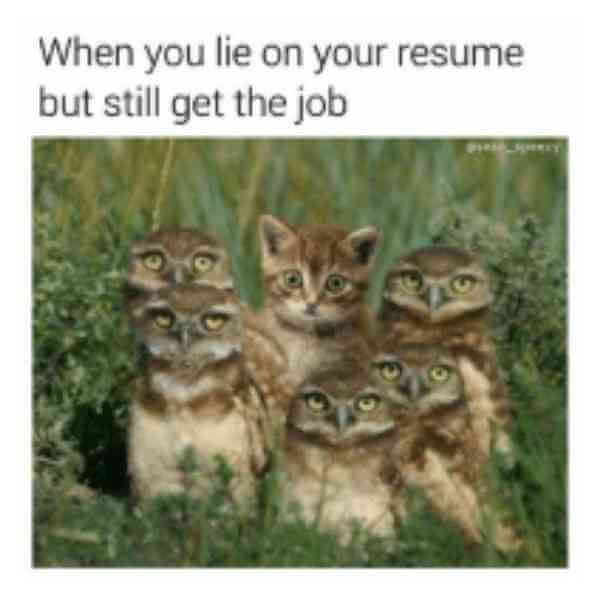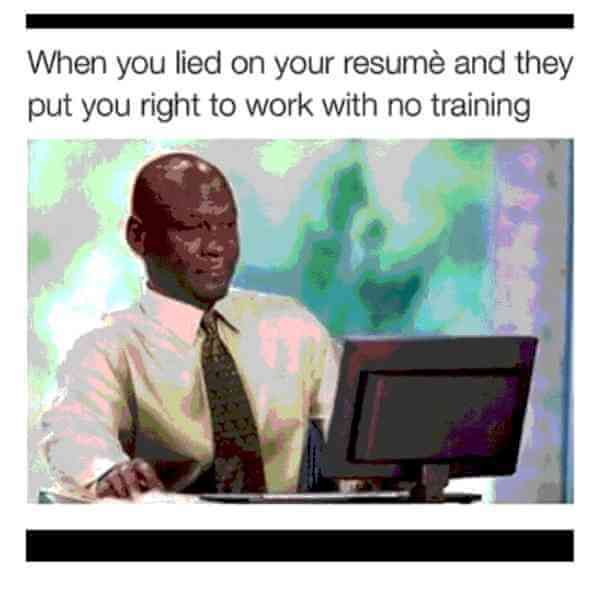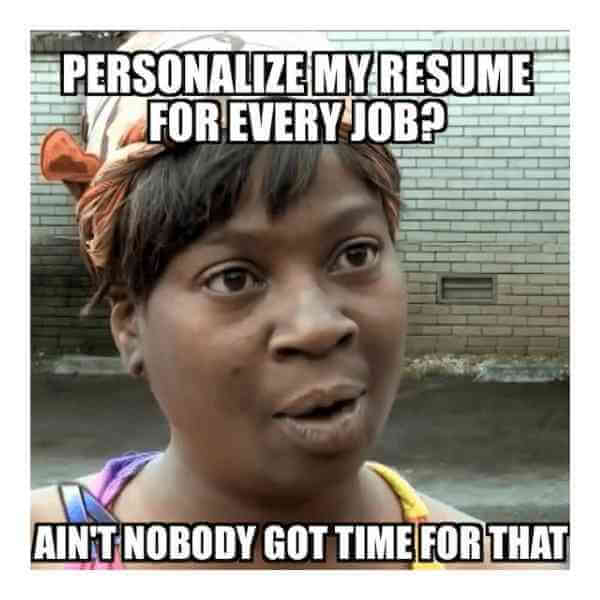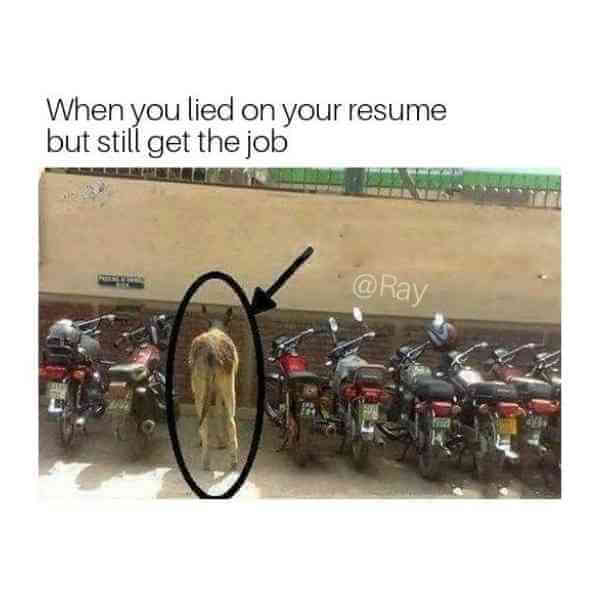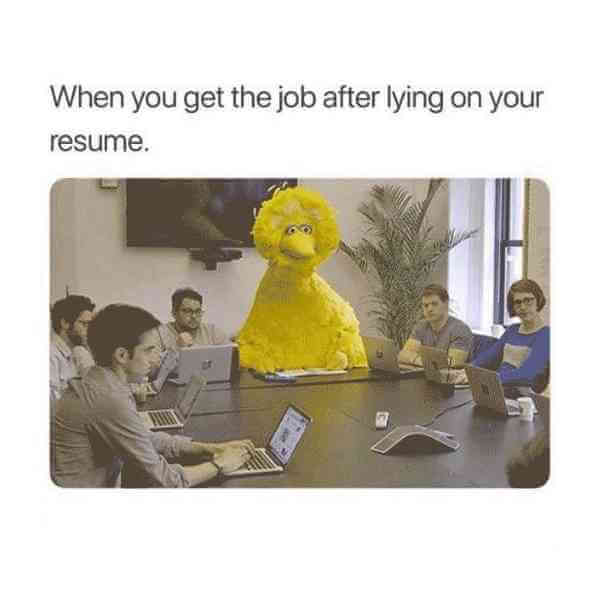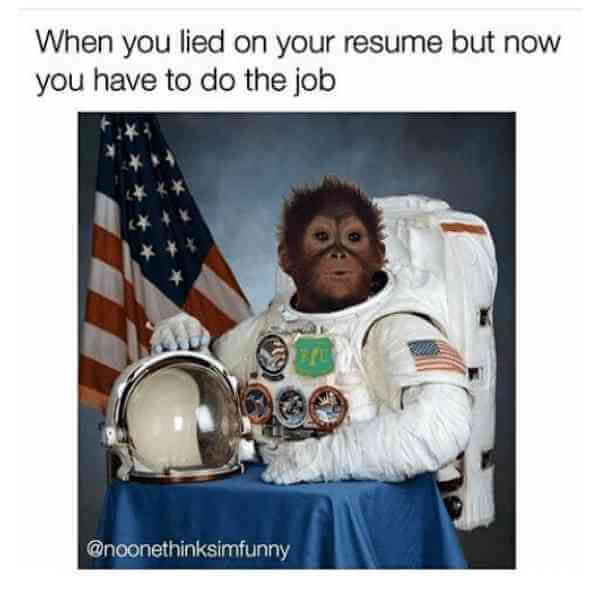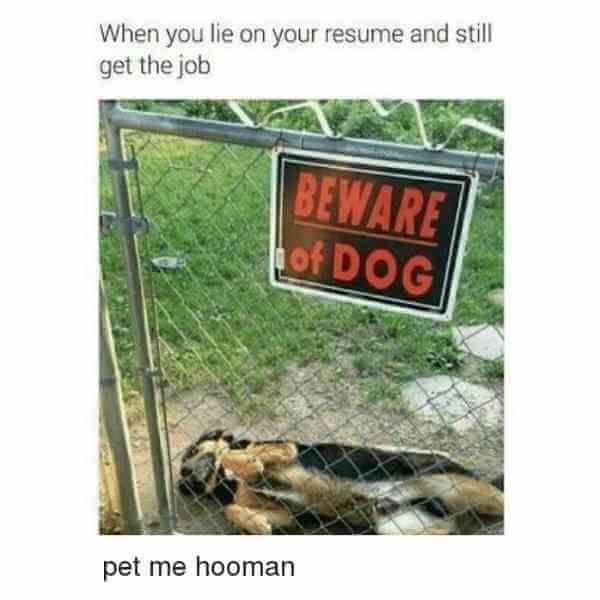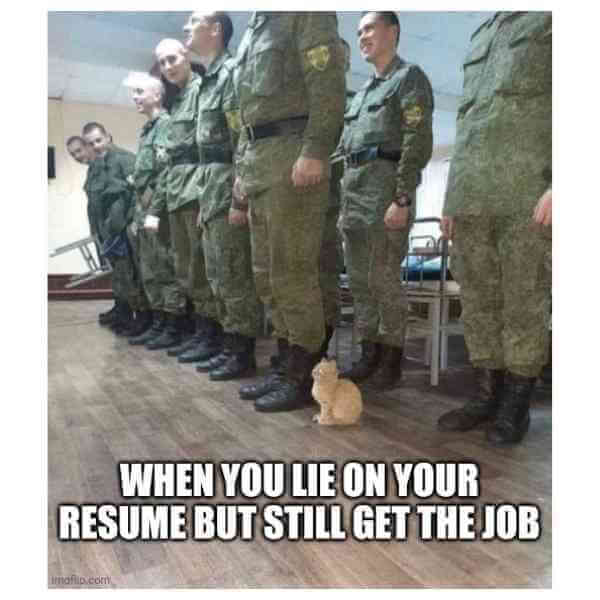A great when you lie on your resume meme is always fun when scrolling social because memes are hilarious. When you lie on your resume, job application form, cover letter, or any time during your job search, it’s often because you’re trying to get a job, and something in your background needs to be embellished so you will get noticed in the application process. Needless to say, memes make light of the fact that most people lie or exaggerate something on their resume, and they’re hilarious.
Interestingly, Harver, a reference checking company, shows that over 70% of job candidates who recently applied for or received a job offer admit they did or would consider misrepresenting themselves on their application. The stress of finding a job is simply leading job seekers to lie on their resumes to stand out.
The survey included responses from 400 job applicants and 400 hiring managers, recruiters, and other human resources professionals. Here are the most common lies told during the hiring process and the share of candidates who have or would consider telling them:
- Having a mastery of skills they barely use (like Excel or a foreign language): 60%
- Working at a company longer than they did to omit another employer: 50%
- Having a higher GPA by more than half a point: 49%
- Holding a director title when the actual role was a manager or another equivalent level: 41%
- Earning a degree from a prestigious university when they were actually a few credits short: 40%
- Earning a degree from a prestigious university instead of where they went: 39%
- Earning a degree from a prestigious university when they’d only taken one class online: 39%
- Saying they achieved things they didn’t: 33%
At Matchbuilt, while working with 1000s of candidates over the years, we’ve seen our share of new job candidates lying on their resumes. We’ve found the most egregious lies are that you graduated from college when you didn’t, when you stayed at a job longer than you actually did, and when you misrepresent why you left a particular position (got fired). That said, when you completely lie on your resume memes are hilarious, so we’ve devoted a post to it that we’ll continue to update.
When You Lie on Your Resume and Still Get the Job Memes
Tips to Avoid Lying on a Resume and Becoming a Meme
Kim Issacs, a resume expert at the leading job board, Monster, suggests staying honest, keeping an eye on your resume design, and getting in front of any potential issues.
Stay honest: It sounds cliché, but honesty is the best policy. Instead of using evasion or complete distortion of facts, try the following strategies:
Rethink your design: “A common way to format dates on your resume is to right-justify or left-justify them, so they’re set apart from text,” says Isaacs. But “lone dates surrounded by a river of white space draws the eye—so it’s not a good choice for someone trying to downplay frequent job changes.” Instead, place the dates next to job titles or employer names, so they blend in with the other content, she suggests.
Get in front of a potential issue: You might be tempted to leave off a job in which your departure didn’t go well, but omissions are like lies and can be just as harmful. “Sometimes bad things happen; if you’re honest and upfront, you can overcome that.”
How You’ll Get Caught Lying and Become a Resume Meme
The team at Glassdoor offers the following list of ways you can get caught lying on your resume. Keep these in mind, so you don’t become an internet meme yourself.
-
Your alma mater can’t confirm you graduated: Claiming to be a Harvard graduate when you have a degree from a no-name state school is one of the worst things you can lie about on your resume, according to hiring managers surveyed by Hloom. And while some employers will take you at your word when you say you went to a fancy school, others will check on your educational background by calling the school directly or using a service like the National Student Clearinghouse. Sometimes, it’s interested third parties who clue an employer into a lie, such as the student journalists at a Kansas high school who discovered their new principal had inflated her educational credentials.
-
You can’t pass a skills test: It’s easy to say you’re proficient in everything, from conversational French to coding, on your resume. But proving you actually have those skills is another thing entirely. Employers realize how simple it is for people to exaggerate their skill set, so don’t be surprised if you’re asked to demonstrate your talents. An interviewer might ask you a question in the language you claim to be fluent in or give you an on-the-spot quiz. Failing such a basic test is a sure sign that you’ve either stretched the truth or overestimated your abilities, which will likely take you out of the running for a job.
-
Dates don’t add up: According to OfficeTeam, roughly a quarter of resume liars are fibbing about their employment dates. If you’re tempted to cover up a resume gap by fudging employment dates, don’t do it. A quick call to your past employer is all it takes for someone to find out that you got laid off back in January, not June. Trying to cover a gap by listing your job history by year rather than month and year is also suspicious and might prompt a hiring manager to do some further digging. If you’re worried about a resume gap making you look like a slacker, fill it with volunteering or consulting work, not lies.
-
Your resume and cover letter don’t match: A sparkling, error-free resume paired with a messy cover letter is a red flag that a candidate is not being sincere. Such a discrepancy suggests you got a helping hand with your C.V. or even stole another person’s work history to pass off as your own. Being unable to recall key details of your experience and jobs during an interview is another huge giveaway you’ve fabricated from your past employment.
-
Your job titles are too good to be true: Two years out of college and already sitting in the C-suite? Expect an interviewer to ask some pointed questions about your responsibilities to make sure you’re actually telling the truth about your title. Inflated job titles will also come to light if prospective employers call your ex-boss to confirm your past employment. That’s when the promotion you gave yourself from marketing intern to senior marketing manager will be revealed.
-
You’re vague about your skills and experience: Job candidates might stretch the truth by using vague terms to describe their skills and expertise. Perhaps they reason it’s OK if they’re not spouting an outright lie. But savvy interviewers will spot people who aren’t quite as knowledgeable as they initially appear. “Using ambiguous phrases like ‘familiar with’ or ‘involved in’ could mean the candidate is trying to cover up a lack of direct experience,” noted OfficeTeam. In other words, claiming to be familiar with event planning because you sometimes pick up doughnuts for the weekly staff meeting isn’t going to fly.
-
Your body language betrays you: You might think you’re an impeccable liar. But subtle body language cues in the interview could give away your resume lies. “A lack of eye contact or constant fidgeting may suggest dishonesty,” noted OfficeTeam, though those behaviors aren’t guarantees of dishonesty. Touching your nose, looking down when you’re answering a question, and turning your body away from the interviewer are other ways you might inadvertently signal that you’re not telling the truth, according to the Los Angeles Times.
-
Your references don’t back you up: If you’re a skilled liar, you might get away with embellishing your skills or past responsibilities in an interview or on your resume. But you won’t necessarily be able to count on your references to back you up. An honest reference will reveal the actual extent of your job responsibilities or the truth about your so-called accomplishments. Even if you find a reference willing to go along with your charade, the interviewer might do some extra digging on their own, reaching out to mutual connections or independently contacting your old boss or co-workers to find out what you’re really like. And remember, no laws restrict what an ex-employer can say about you, despite what some job seekers might think.
-
A Google search reveals the truth: Seventy percent of employers snoop on candidates before offering them a job. You better hope that what HR finds on social media or as part of a basic Google search matches what you have on your resume. Of employers who decide not to hire someone after researching them online, 27% did so because they discovered the candidate had lied about their qualifications, CareerBuilder found. A little Nancy Drew-style sleuthing is all it takes to discover that your alma mater is a diploma mill or that the company you claimed to work for last year went out of business a decade ago.
-
The employer conducts a background check: Not all employers conduct formal background checks. But if you encounter one that does, it will sink you if you’re being untruthful. Don’t expect a job offer if a prospective employer conducts a background check and discovers you’ve lied (either directly or by omission) about your work history, criminal past, education, professional certifications, or other key facts.
What constitutes a “little white lie” on a resume?
There are several common ways job applicants “enhance” their resumes, convinced such statements will improve their chances of landing the job.
Per Fast Company, the most common lies are in work experience, such as taking full credit for a project others worked on or overstating sales figures.
Applicants often claim skills they don’t have, such as language proficiency, or misrepresent job responsibilities. Another form of a white lie is literally that: Using white fonts in the blank areas of the resume, designed to fool the Applicant Tracking System (ATS) and get you beyond the software that 90% of companies use. The white font presents keywords and inflated credentials that the job seeker assumes only the software can read.
What are the most common resume lies job seekers tell?
Leading job board, Monster suggests lies about education, dates, and skills are the most common resume fabrications.
- Education embellishments: People try to make more of a course or two they took than they should. Some didn’t even attend a class at a college they said they graduated from.
- Date deception. Another common deceit is to cover employment gaps by stretching dates for one or two jobs to cover a time gap or fabricating a temporary position.
- Skill stretching. Many job candidates offer a laundry list of technical proficiencies, but just because you used a program a few times doesn’t make you an expert. The same goes if you claim to be fluent in a language just because you took a year of it in high school.
What is a meme?
A meme is a funny image, video, piece of text, etc., copied (often with slight variations) and spread rapidly by internet users. Per Wikipedia:
An internet meme, more commonly known simply as a meme, is an idea, behavior, image, or style spread via the Internet, often through social media platforms. What is considered a meme may vary across different communities on the Internet and is subject to change over time. Traditionally, they were a concept or catchphrase. Still, the concept has become broader and multi-faceted, evolving to include more elaborate structures such as challenges, GIFs, videos, and viral sensations.
Internet memes are considered a part of Internet culture. They can spread from person to person via social networks, blogs, direct email, or news sources. Instant communication on the Internet facilitates word-of-mouth transmission, resulting in fads and sensations that proliferate. An example of such a fad is planking (lying down in public places); posting a photo of someone planking online brings attention to the fad and allows it to reach many people in little time. The Internet also facilitates the rapid evolution of memes.
When You Lie On Your Resume and Get the Job Anyway Memes Summary
Funny resume memes will probably stand the test of time because people will always lie on their resume to get consideration for a particular job. Further, resume writing isn’t easy, so embellishing a specific skill to attain your dream job may be the easiest path forward.
That said, getting caught in a big lie on your resume or cover letter can waste a ton of time for you and the human resources department, and that first day at the office can be very embarrassing, as these ridiculous memes show. Don’t become a resume meme; check out these tips:
50 Tips on Building a Great Resume
How to Say Fast Learner on Your Resume
Should You Put Your Address on Your Resume
How to Put Dean’s List on Your Resume
How Many Bullet Points Per Job on Your Resume
